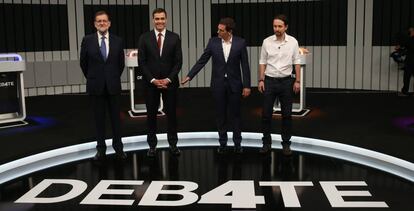Four-way debate suggests little change to Spain’s post-election landscape
Podemos continues to reach out to Socialists, while acting prime minister Rajoy repeats call for government of national unity

The economic policies and corruption scandals of the eight years of acting Prime Minister Mariano Rajoy’s administration came under a sustained three-pronged attack during Monday evening’s televised debate between the leaders of Spain’s four main parties.
Reflecting the political shift Spain has undergone in recent years, the debate was the first to put Podemos and Ciudadanos on the same footing as the Popular Party (PP) and the Socialists (PSOE), who between them have dominated politics for the last four decades.
Over the course of the two-hour exchange, which will be the only four-way debate in the run-up to the June 26 elections, Socialist Party leader Pedro Sánchez, Pablo Iglesias of Unidos Podemos and Albert Rivera of Ciudadanos spent most of their time criticizing Rajoy’s austerity policies and his government’s failure to kickstart Spain’s economy after two terms in office.
They also highlighted the numerous corruption cases that have rocked the PP in recent years.
Rajoy defended his record, saying: “To govern is difficult, to preach is easy.”
Rajoy insisted that as the party likely to win the most votes is the PP, he should be allowed to form a government
The four leaders each blamed one another for their failure to reach agreement on a coalition government in the six months since the inconclusive elections of December 20, which gave the PP a narrow lead, but insufficient to form a government on its own.
Sánchez highlighted Podemos’s decision to side with the PP in Congress by voting against an attempt by the Socialists and the center-right Ciudadanos to form a government.
Iglesias was careful to avoid direct confrontation with Sánchez, instead calling on the Socialist leader to team up with Unidos Podemos (United We Can), a coalition with the Communist Party -led United Left. “There are only two options: the PP or a progressive government,” he said.
Opinion polls indicate that the June 26 elections will be a replay of December’s. A survey by Metroscopia, published in EL PAÍS on Sunday, shows the PP will likely win 28.9% of the vote, with the Socialists taking 20.8% and Ciudadanos 15.9%. Unidos Podemos is forecast to win 25.4%.
The four leaders pledged to do everything possible to avoid a repeat of the impasse of the last six months. “There will be no further elections,” said Iglesias, reaching out to the Socialists. Rivera said he would support “a government of change”, without going into further details. Sánchez said he would be mobilizing support among his party’s grassroots, while Rajoy insisted that as the party likely to win the most votes is the PP, he should be allowed to form a government, calling on Ciudadanos and the Socialists to form an administration of national unity.
Iglesias repeated his formula of a broad-left government with the Socialists that would install as prime minister the leader whose party garnered most votes. But Sánchez is unlikely to tolerate playing second fiddle to Iglesias in any future administration.
Sign up for our newsletter
EL PAÍS English Edition has launched a weekly newsletter. Sign up today to receive a selection of our best stories in your inbox every Saturday morning. For full details about how to subscribe, click here.
In short, Spain’s media agreed that there were no new proposals from any of the four, with no clear winner emerging from the debate.
English version by Nick Lyne.
Tu suscripción se está usando en otro dispositivo
¿Quieres añadir otro usuario a tu suscripción?
Si continúas leyendo en este dispositivo, no se podrá leer en el otro.
FlechaTu suscripción se está usando en otro dispositivo y solo puedes acceder a EL PAÍS desde un dispositivo a la vez.
Si quieres compartir tu cuenta, cambia tu suscripción a la modalidad Premium, así podrás añadir otro usuario. Cada uno accederá con su propia cuenta de email, lo que os permitirá personalizar vuestra experiencia en EL PAÍS.
¿Tienes una suscripción de empresa? Accede aquí para contratar más cuentas.
En el caso de no saber quién está usando tu cuenta, te recomendamos cambiar tu contraseña aquí.
Si decides continuar compartiendo tu cuenta, este mensaje se mostrará en tu dispositivo y en el de la otra persona que está usando tu cuenta de forma indefinida, afectando a tu experiencia de lectura. Puedes consultar aquí los términos y condiciones de la suscripción digital.








































